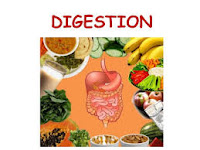Mouth – This is where it
all begins. As we chew our food, our
saliva helps break the food down, causing
more surface area which makes
the food easier to digest (The Digestive System: Crash Course Biology
#28).
Esophagus – The
esophagus is situated in the throat and uses contractions, called peristalsis,
to help
push food down to the
stomach (Cleveland Clinic. The Structure and Function of the Digestive System).
Stomach – The stomach is
an empty container that holds food while enzymes break the food down into
portions that can be
better used. After these acids and
enzymes do their job, the stomach releases the
food into the small
intestine (Cleveland Clinic. The Structure and Function of the Digestive
System).
Small intestine – The
small intestine has three parts; the duodenum, jejunum, and ileum. The small
intestine can be as long
as 22 feet. It uses enzymes from the
liver that are released by the pancreas and
bile to further break
down the food. The duodenum continues
the breaking down process and the
jejunum and ileum absorb
nutrients into the blood stream (Cleveland Clinic. The Structure and Function
of
the Digestive System).
Large Intestine – The
large intestine is responsible for absorbing water from food that is not able
to be
Digested (NIH. Large Intestine).
Rectum – The end of the
large intestine that allows undigested food to be expelled from the body.
Now, that wasn't so bad, was it? As you can see, our body has a lot of work to do in order to absorb all the nutrients from the foods that we consume.
Resources
Cleveland Clinic. The Structure and Function of the Digestive
System
Retrieved from: http://my.clevelandclinic.org/health/ns_overview/hic-the-structure-and-function-of-the-digestive-system
NIH. U.S. National Library of Medicine. Medline
Plus. Large Intestine
Retrieved from: http://www.nlm.nih.gov/medlineplus/ency/imagepages/19220.htm
The Digestive System:
Crash Course Biology #28
Retrieved from: https://www.youtube.com/watch?v=s06XzaKqELk

No comments:
Post a Comment